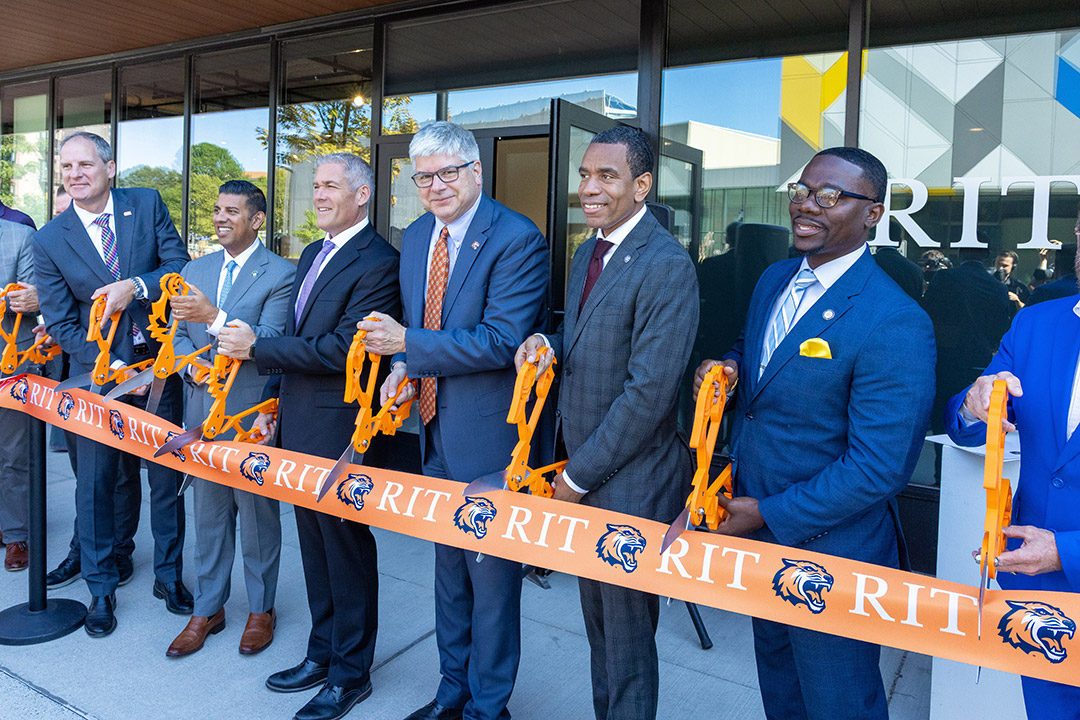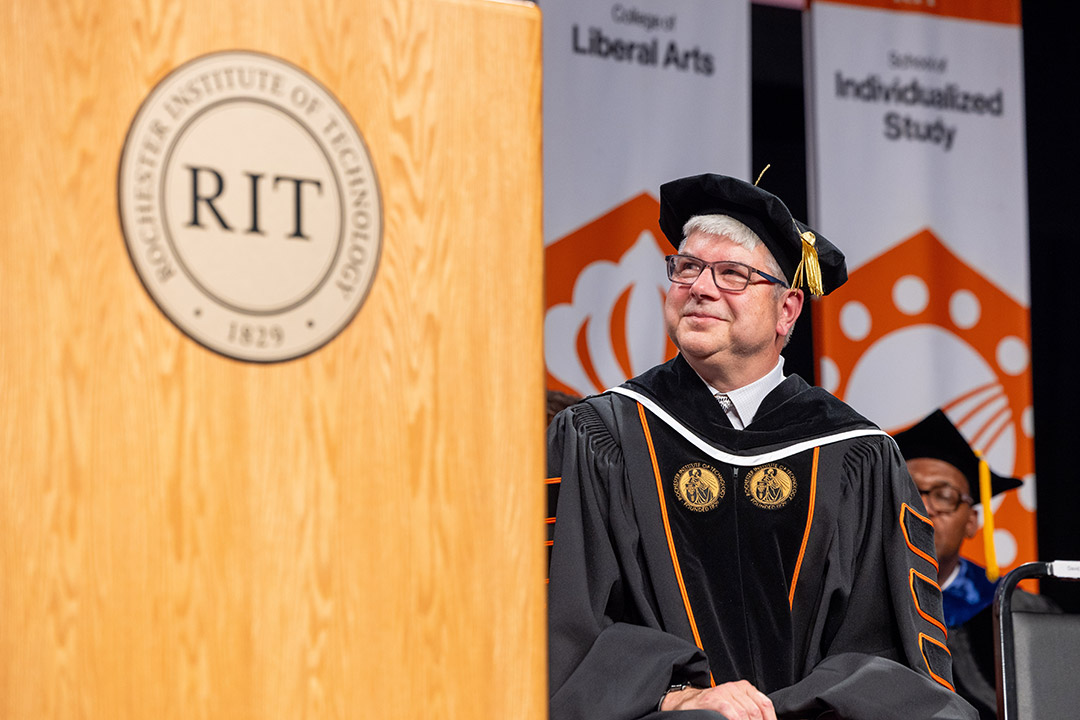Sustainability Ph.D. student earns Quad Fellowship
Sherralyn Sneezer, a Ph.D. candidate at RIT’s Golisano Institute for Sustainability, has been selected as a 2025 Quad Fellow. She joins a cohort of 37 students focused on applying science and technology to pressing global problems.
Now in its third year, the Quad Fellowship supports emerging STEM leaders through cross-cultural exchange and policy engagement. Backed by the “quad” governments of the U.S., Japan, Australia, India, along with 10 countries in the Association of Southeast Asian Nations, the program offers financial support and a yearlong series of workshops and mentorship opportunities for fellows studying in the U.S. and Japan. It is administered by the Institute of International Education and funded by partners, which include Google.
For Sneezer, the fellowship arrives at a pivotal moment as she nears the end of her doctorate journey. “Honestly, I applied because I needed funding,” she said with a laugh. “But during the process I realized how much this program can impact my research.”
Sneezer (Navajo/Diné and San Carlos Apache) is researching how the development of clean energy can support energy sovereignty on tribal lands.
“For example, some tribes are installing solar arrays to lower monthly bills for their members. Others are bringing power to homes that have never had electricity,” Sneezer said. “I’m interested in how these projects reflect tribal priorities and offer solutions that align with self-reliance.”
Through interviews and case studies, Sneezer is also examining environmental and policy pressures, which shape tribal energy decisions. She’s tracking how data center development, mineral extraction, and policy complexity intersect with the growing environmental costs of meeting energy demand.
These tensions are growing. According to research from MSCI, the vast majority of U.S. reserves of critical minerals—lithium, copper, nickel, and cobalt among them—are located within 35 miles of Native American reservations.
One example she brings up is a longstanding dispute in Oak Flat, Ariz., a place sacred to the San Carlos Apache and other Western Apache tribes. It’s also the site of one of the largest copper deposits in North America. It’s a battle that has reached the Supreme Court and is currently in appeal.
She brought up those issues during the fellowship interview process, an experience Sneezer described as eye-opening.
“I ended up talking about how many critical resources in the U.S. are located near tribal land, and who stands to benefit from that,” she said. “Someone I talked to in an interview put it this way: ‘Indian Country has been inventoried by many people.’”
Sneezer, who was named GIS’ Outstanding Graduate Woman in 2023, credits the support of her peers and mentors, including her adviser, assistant professor Nathan Williams, and professor Callie Babbitt, for helping her refine both her research and her voice.
“What really sets her work apart is that it is fundamentally grounded in engaging with and understanding the values and objectives of Tribal communities,” said Williams. “Too often, researchers look for solutions first and then try to find problems that their solution can solve. Sherry has taken the time to first engage with communities and understand challenges from their perspectives.”
“Sherry’s approach exemplifies so much of what it means to be a Sustainability scholar,” added Babbitt, who serves on Sneezer’s Ph.D. committee. “She shows an understanding of the interconnection between social, economic, and environmental issues, an appreciation for the broader human, policy, and cultural factors surrounding technology decisions, and an ability to communicate and collaborate across academic disciplines and with the broader public community.”
Latest All News
- RIT partners with UB to offer path to medical schoolRochester Institute of Technology and the Jacobs School of Medicine and Biomedical Sciences at the University at Buffalo are offering a new pathway to medical school for eligible RIT students. The Early Opportunity Program in Medicine (EOPIM) is a pre-admission program to the Jacobs School. Accepted students will gain professional interaction and career training at the medical school while earning their undergraduate degree at RIT. The program is seeking applicants with a 3.5 or higher grade point average who have experienced social-economic challenges and other barriers to education. An information session will take place at noon on Sept. 17 in the Louise Slaughter Hall, room 1630, to share details about the program and application process. The RIT nominating committee will accept applications through Nov. 1 and submit recommendations to the Jacobs School by March 1. During the spring semester, the RIT committee will inform applicants of their status and next steps for students nominated for the UB program, according to Todd Camenisch, RIT director of biomedical sciences. “Admission to medical school is highly competitive, and RIT is excited to offer students an affiliation with the University at Buffalo,” Camenisch said. “Many RIT students have life experiences and academic achievements that will make them outstanding and compassionate medical doctors. This new EOPIM program gives students an opportunity to get into medical school and positively impact the human condition.” RIT can nominate as many as six students per year, or 18 students over three years, for consideration into the early assurance program at the Jacobs School. The universities will reassess the agreement at the end of three years. According to Camenisch, the EOPIM program can benefit students in different ways, such as by:Waiving the required secondary application and fee; Preparing students for the medical school entrance exam; Coaching students on the interview and letter writing skills of successful candidates; Connecting students with peer mentors who are current medical school students; and Hosting a summer academic program at the Jacobs School for students between their junior and senior year. Camenisch will lead the early assurance program and nominating committee. He will work closely with the Jacobs School admission team throughout the process. The majority of students who apply to medical school enroll in the College of Health Sciences and Technology, while other pre-med students pursue undergraduate degrees mostly from programs in the College of Science and the Kate Gleason College of Engineering. The RIT Office of Pre-Health Professions, led by Amber Charlebois, is a universitywide resource for all RIT students navigating pre-med requirements and is represented, along with the different colleges, on the selection committee. Contact Todd Camenisch, at tdcbms@rit.edu, or Amber Charlebois, at afcphp@rit.edu, for more information.
- Performing arts lineup includes productions, concerts, dances, and a new theaterWith more than 3,000 students participating in the performing arts at RIT, including a record 601 new Performing Arts Scholars and more than 50 performing arts-focused student clubs, it’s not hard to find instrumental, vocal, theatrical, and dance performances on and around campus throughout the year. RIT’s School of Performing Arts and the National Technical Institute for the Deaf have released their 2025/2026 Joint Theatrical and Dance Season. From small ensembles playing in intimate settings such as the Allen Chapel, to staged, ticketed productions in the Robert F. Panara Theatre and the Sklarsky Glass Box Theater in the SHED, there will be plenty of opportunities to enjoy the students’ talents. “The Performing Arts ecosystem on campus has grown at a staggering pace, with one in seven undergraduate students on campus a Performing Art Scholar,” said Erica Haskell, director of the School of Performing Arts. “We offer our students the opportunity to major in STEM-focused fields while participating, at a high level, in music, theater, technical theater, and dance. Our performing students continue to exceed expectations.” Carlos Ortiz/RIT Double Stop!, a rocking cello duo featuring Brandon Faunce, seated, and Gavin Palmer performed as the previous year’s winners during last February’s Ovation: RIT Performing Arts Competition. Students have recently won prestigious awards from the Kennedy Center American College Theater Festival, and the RIT Wind Ensemble was selected to perform at the College Band Director’s National Association Eastern Convention. “These honors are usually only achieved by students pursuing degrees in the performing arts,” Haskell said. “Our highly qualified and deeply interdisciplinary faculty provide expertise and inspiration that enrich students’ experience and result in exceptional performances while the Rochester arts community offers ample events and performances to attend.” Among the first public performances this year are during the communitywide ESL Rochester Fringe Festival, Sept. 9-20, which boasts more than 600 events. Several are RIT-related, including performances of a cappella groups, dance, improv, and short films by RIT students. All RIT events are free and held in downtown Rochester at the Little Theater, 240 East Ave. Free shuttle service on Fridays, Saturdays, and Sundays is available for students. On Oct. 17-19, numerous performances by student groups will be held throughout campus during Brick City Homecoming and Family Weekend. The comedic thriller The 39 Steps, adapted from a movie by Alfred Hitchcock, runs Nov. 7-10. As with all RIT/NTID Performing Arts productions, deaf actors will use American Sign Language, while hearing actors will perform in spoken English. Shakespeare’s Macbeth, with a technological twist, will be performed Nov. 13-16. It will include music with ambient electronic backing tracks and live percussion, performed by students stationed throughout the Sklarsky Glass Box Theater. “Each percussion station, positioned on the balconies, will feature a mix of traditional instruments such as cymbals and drums, and unconventional ‘found instruments’ such as brake drums, metal pipes, wrought iron fencing, thunder sheets, wooden boxes, and metal tanks,” said Joel Hunt, assistant professor of music and the production’s musical director. The popular student talent competition, Ovation: RIT Performing Arts Competition, is scheduled for Feb. 6 in Ingle Auditorium. There are typically a wide variety of acts, some solo, some bands, some ensembles, and some surprises. Students audition for a spot to compete for top honors. On March 26-29, The Nether, a sci-fi thriller that examines the nature of mortality in a virtual age, will be performed in the Sklarsky theater. Living in a virtual world, the characters explore the boundaries of reality, ethics, and identity. The inaugural event at the new Music Performance Theater, featuring a 750-seat theater, is expected this spring. Till There Was You, directed by Christopher Ryan, celebrates the diverse ecosystem at RIT with theater, dance, and music, with various selections from musical theater. On April 17-19, Pure Imagination: The Magical Candy Shoppe, will feature a fantastical world told through fusion of dance, music, American Sign Language, and multimedia, with ballet, tap, jazz, modern, Afro hip-hop, acrobatic dance, animated avatars, and cutting-edge projection technology. It will also be the final performance at RIT for Professor of Practice Thomas Warfield before his retirement. And dozens of campus bands with hundreds of student musicians are expected at the Unlabeled Music Festival on April 18 in the SHED. For more information on the productions and ticket information, visit the Performing Arts website.
- City Art Space celebrates new downtown locationRIT’s City Art Space is ready to welcome visitors to its new downtown location in the heart of Rochester’s Neighborhood of Play. The gallery will host an opening reception on Friday, Sept. 5, from 6-9 p.m. The new space, located at 30 Adventure Place, is steps away from the recently renovated Strong National Museum of Play, along with neighboring residences, restaurants, and live music venues. On Sept. 3, the gallery hosted a ribbon cutting ceremony at the new location and welcomed RIT President Bill Sanders, Rochester Mayor Malik Evans, Monroe County Executive Adam Bello, New York State Senator Jeremy Cooney, New York State Assemblyman Demond Meeks, and New York State Assemblymember Harry Bronson. During the event, Evans remarked that the Neighborhood of Play has made a great impact on revitalizing the downtown Rochester community. He said the addition of City Art Space makes the district even more vibrant and welcoming. “This is the place where creativity, innovation, and play all come together. That combination is part of what makes Rochester such a unique place to live: A place where ideas turn into art, and art inspires new ideas,” said Evans. “RIT’s City Art Space isn’t just a gallery. It’s a bridge between campus and community. A place where students and faculty can share their work, and where all of us can come to see, learn, and be inspired.” Sanders said that the ribbon cutting and new location for the gallery underscores the university’s commitment to the City of Rochester. “City Art Space has long been a place where our students, faculty, alumni, and community artists share their creativity, their connections, and showcase the incredibly breadth of talent that defines RIT and the city,” he said. “This is RIT’s only downtown venue dedicated to art, design, and creativity, and we are thrilled to continue that legacy.” Operated by RIT’S College of Art and Design, the gallery hosts exhibitions, events, and educational programming year-round, serving as a site for experiential learning for students, while remaining free and open to the public. Todd Jokl, dean of the College of Art and Design, underscored the significance of the gallery’s new location, highlighting the “strong” partnership between RIT and the Strong Museum. “We are ecstatic as we enter this next chapter in RIT City Art Space’s more than two decades located in the downtown community,” said Jokl. “We encourage you to come down for a visit to RIT City Art Space, the Strong Museum, and the wonderful restaurant and entertainment partners all around us in this vibrant Neighborhood of Play.” Gallery Director John Aasp teased upcoming programs and events, including the Roc Indie Book & Zine Fair and exhibitions featuring work from RIT faculty and students that will sustain and grow RIT’s connection to downtown Rochester. What he looks forward to most, he says, is deepening the connection between RIT students and the local community. When visiting the new, centralized location, students can explore the gallery, visit the Strong Museum, get a bite to eat or drink, and appreciate the culture of downtown Rochester. Carlos Ortiz/RIT The new, central location for the gallery will open the door for more student and community engagement. The first exhibition, DESIGN X GLASS, features work produced through a partnership with RIT and the Corning Museum of Glass. “You’re always going to see something different when you visit. It could be a group of students working on their senior projects, it could be a faculty member showing their recent work, or a big community collaborative project,” said Aasp. “We aim to keep a variety of meaningful, expressive, creative projects that are accessible and spark different aspects of learning for many different audiences. That has been something that we've been committed to for a quarter century.” DESIGN X GLASS is the gallery’s premiere exhibition in its new location. Inspired by the historic vision of influential designers Lella and Massimo Vignelli, this exhibition highlights individual projects by contemporary designers from all disciplines in collaboration with master glass blowers at the Corning Museum of Glass. On view from Sept. 5 through Sept. 21, the exhibition will feature work born from an ongoing partnership between the Corning Museum of Glass and RIT design faculty, staff, and students. Other new exhibitions coming to City Art Space this fall include:Jennifer Schoonmaker + Christina Leung exhibition, open Oct. 3 through Oct. 26. Eric Kunsman: "Felicific Calculus" exhibition, open Oct. 31 through Nov. 23. First Year MFA Projects 2025 exhibition, open Dec. 5 through Dec. 21. Downtown history City Art Space has an over 25-year history in downtown Rochester. It began as Gallery r on Park Avenue in 1999, driven by a small group of art faculty who wanted to keep a connection between RIT students and the downtown art community. In 2012, it moved to a new space on College Avenue near Village Gate Square, continuing its mission in Rochester’s Neighborhood of the Arts. With its rebranding and relocation to Sibley Square in 2018, City Art Space further expanded its scope and widened its impact on Rochester’s arts and culture community. Over the last seven years, the space has broadened its programs, including new collaborations with local artists and organizations, projects with major museums and collections, while continuing to feature the creative work of RIT students, faculty and alumni. Artist talks, panel discussions and community gatherings are frequent, alongside First Fridays, Rochester’s monthly city-wide gallery night. Go to the City Art Space Website for more information, or subscribe to the gallery’s newsletter for updates.
- RIT Esports assembles its newest teams for the game ‘Marvel Rivals’This fall, RIT Esports is assembling its newest teams for collegiate competition in Marvel Rivals. Marvel Rivals is a hero shooter video game, with similar gameplay to Overwatch 2. Since its launch in late 2024, the game has quickly established a competitive esports scene. RIT Esports introduced trial Marvel Rivals squads in spring 2025. This fall, the university will have official Division I, II, and III Marvel Rivals teams. Marvel Rivals tryouts will be held Sept. 6 and 7, through the RIT Marvel Rivals Discord server. Tryouts for many other RIT Esports teams will take place early this semester. For more information, go to the RIT Esports Discord server. About RIT Esports RIT Esports currently competes in 21 games, including Rocket League, Hearthstone, and League of Legends. With more than 200 competitive players and 2,600 community members, RIT Esports has become one of the largest and best collegiate esports programs in the world. The club also has student-led operations teams that run everything from designing the jerseys to live-streaming matches. Operations teams include Production, Broadcasting, Graphic Design, Development, Events, Video, Marketing, and the Executive Board of student leaders. In 2025, RIT began offering esports scholarships. The first 12 scholarship students are now playing for RIT. Meet a Marvel Rivals player Donovan Gallagher, a second-year global business management student from Fairfield, Conn., was captain of an RIT Marvel Rivals squad last spring. His team qualified for the ECAC Esports Marvel Rivals Collegiate Open playoffs and placed among the top 16 in the country. With the convergence of the university’s top Marvel Rivals players, a new RIT convoy will be poised for domination in the collegiate esports scene. Now, Gallagher is helping the esport grow at RIT. He plans to try out for the new teams this year with the goal of representing the university on the national stage. Question: Why do you like esports? Answer: I loved playing video games when I was a kid, it felt like an escape for me. As I got older, I got more competitive. In high school, I put together the Fairfield Ludlowe Falcons esports team, which quickly became my friends. We placed third in the 2023 EGF High School Nationals for Overwatch 2 and took first place in 2024. That feeling of winning after years of hard work and planning was something I still chase to this day, and I want the same for our own RIT Marvel Rivals community. Q: What’s it like venturing into new esports territory? A: Thankfully, we’re not totally in the dark when it comes to exploring this game’s potential and strategies. The game was created with the idea of esports in mind, and a lot of the mechanics and gameplay are similar to Overwatch 2. We have spent a lot of time trying out different teams compositions based on the most powerful characters in the game and experimenting in custom matches and scrimmages. A huge part of the game is having a solid understanding of teamwork, communication, and mechanics. Q: What can RIT Marvel Rivals esports players expect? A: Each roster will play two matches a week. Based on last year’s run, players on a roster can expect additional practices and VOD reviews, where you watch matches back through the replay system and take notes. The schedule is crafted based on each team member’s availability. Q: What is your go-to character? A: I play characters with the Tank role in Marvel Rivals. Last year, some of the characters I performed best on were—in order—Dr. Strange, Peni Parker, Emma Frost, Groot, and Magneto. My favorite game mode is Domination, where two teams fight each other to hold control of a single point in a space called the Mission Area. Going pro RIT Esports alumnus Anthony Lagreca ’24 (applied arts and sciences) is now a semi-professional Marvel Rivals player for the NTMR Embers (pronounced nightmare). Lagreca—who is known by the gamertag “waffz”—played for RIT’s Dota 2 and Valorant teams and was a manager for Dota 2.
- Sanders looks ahead to new academic yearRIT President Bill Sanders will welcome the community back to campus and give his first State of the University Address at 3 p.m. on Wednesday, Sept. 10. The address will be inside Ingle Auditorium in the Student Alumni Union, and a reception will immediately follow in the adjacent Fireside Lounge. During his address, Sanders will review the past year’s accomplishments and preview university leadership’s agenda and vision for the coming year. Using information gathered from campus partners, he will provide updates on enrollment, faculty and staff highlights, student achievements, as well as several other major milestones. The address will also look forward on issues ranging from artificial intelligence to how to get involved with RIT's strategic framework. “Since my July 1 onboarding, I’ve begun listening tours with each college and division, governance groups, and government and community leaders. I want to find ways to meet and hear from as many of you as possible, so I will continue these during the fall term,” Sanders said in a Aug. 27 memo to faculty and staff. “Our university continues to be defined by the energy, dedication, and creativity of our faculty, staff, and students, and I have no doubt that the year ahead will showcase the very best of what we can accomplish together.” In addition to President Sanders, campus leaders from the Division of Access, Engagement, and Success, Faculty Senate, Staff Council, and Student Government will make remarks. While the event will be livestreamed on the Office of the President webpage for viewers at RIT’s global campuses and remote locations, students, faculty, and staff are encouraged to attend in person.
- No, you can’t live off protein shakes; RIT student teaches healthy eatingPersonal nutrition doesn’t come in a pizza box. Just ask Maddy Degenfelder. Degenfelder, RIT Student Life Center nutrition educator, is delivering facts about whole foods, supplements, and more through new Recreation and Wellness programs offered by the Division of Student Affairs. Degenfelder, a dietetics and nutrition BS/MS program graduate student from Brockport, N.Y., created Tiger Nutrition as a community health initiative. Her goal is to close the “nutrition-knowledge gap” among students and clarify the latest diet trends. Shortcutting nutrition is shortchanging yourself, Degenfelder said. “What matters more than your health? My goal behind Tiger Nutrition is to foster a holistic approach to student wellness,” she said. “Everyone knows they should eat their fruits and vegetables, but why? I want people to understand how these foods function in their body compared to, say, multivitamins or protein-packed ice cream.” Tiger Nutrition’s peer-to peer education empowers students by making healthy eating advice relatable, accessible, and impactful, according to Michelle Schrouder, program director of RIT Recreation and Wellness programs. Provied Madison Degenfelder shared healthy eating advice last month during student orientation. She stands behind a mobile kitchen given to the Wegmans School of Health and Nutrition by the Katz family. “Students are comfortable talking candidly to peers who understand the realities of college life—tight budgets, dining hall options, and busy schedules—leading to strong trust and follow-through for more information,” Schrouder said. “Programs like Maddy’s, and others in the Student Health Center, create a campus-wide culture of health through personalized practical guidance. For Maddy, this provides her with applied experience, counseling skills, leadership, professionalism, networking, and career readiness.” At the encouragement of her mentor, William Brewer, director of exercise science, Degenfelder pitched Tiger Nutrition to the Recreation and Wellness program. Her intent was to expand upon a sports nutrition workshop she developed for the RIT Women in Weightlifting club with nutrition classes for all students. “Faculty in the Wegmans School of Health and Nutrition are really good about reaching out to students and encouraging us to pursue opportunities,” Degenfelder said. “Professor Bill Brewer gave me the nudge about Tiger Nutrition. ‘I think you would be good at this. You seem passionate about it, why don't you explore it?’ Then, I went and did that.” Another mentor, Elizabeth Ruder, head of the Wegmans School of Health and Nutrition, is not surprised that Degenfelder approached the Wellness program with her idea. “Maddy embodies the kind of student drawn to the Wegmans School of Health and Nutrition—engaged, community-minded, and motivated by service,” Ruder said. “Her initiative not only strengthens her own development as a nutrition professional but also amplifies the reach and impact of our program.” Tiger Nutrition also creates a platform for introducing a new addition to the Wegmans School—a professional-grade mobile kitchen for taking food-prep demonstrations directly to students. The kitchen has an induction cooktop, sink, fridge, electricity, and plumbing. It will be in operation during the spring semester. The mobile kitchen is a gift from the Katz family, on behalf of Kathy Katz, a 1988 graduate from the computer science BS program, who seeks “to impact nutrition education at RIT and help improve nutrition in Rochester,” Ruder said. Tiger Nutrition program for studentsCollege Nutrition 101, 3-3:50 p.m. Mondays; 4-4:50 p.m. Thursdays, Student Life Center (SLC) A-level conference room Food for Thought, 3-3:50 p.m. and 4-4:50 p.m., Tuesdays, SLC A-level conference room Ask an Expert: Nutrition Q&A, 8-10 a.m. Fridays, SLC, Weidman Fitness Center Breaking down the Buzz, 11 a.m.-1 p.m., monthly Saturday sessions, SLC, room 1325.Go to RIT's wellness website for dates and topics. Registration is recommended.













